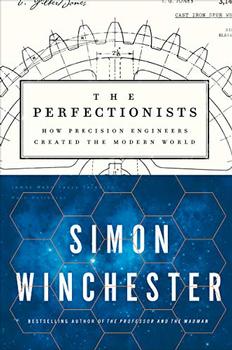Summary | Excerpt | Reviews | Beyond the book | Read-Alikes | Genres & Themes | Author Bio

How the World Became Obsessed With Time
by Simon GarfieldIf you can spare three minutes and 57 seconds, you can hear the driving, horse-gallop beat of Sade's Never as Good as the First Time. Two hours and 19 minutes gets you Walt Disney's masterpiece Mary Poppins. And if you have even more time than that, a great way to pass it is to read Simon Garfield's Timekeepers. Garfield, who has dived before into the broad rapids of history in pursuit of a single subject – Just My Type (about fonts) and To the Letter (about letter writing) – channels the White Rabbit in this book, obsessed with his pocket watch and with - you guessed it - time.
This lively tour through the "practical rather than ethereal applications of time" is full of many amazing delights. Garfield opens with a description of the eccentric Strachey family and, in particular, of William Strachey. After returning to England from a visit to Calcutta he decided to live on Calcuttan time for the next 50 years (5 hours ahead of the UK). Thus he took breakfast at teatime and lunch in the evening, and simple tasks such as taking the train, shopping, and going to the bank became a touch complicated!
More eccentric, fantastic facts follow. Garfield also measures his childhood by "images of timekeeping," such as his father's gold carriage clock in a crimson crushed velvet-lined case that chimed when his four-year-old finger pressed the button at its top. He also explores quirky facts like how railway station buildings in France deliberately set their clocks five minutes early, believing this would ease the stress of passengers worried about getting to their trains late (I'm still trying to figure that one out), how the Beatles recorded their entire output in a span of only seven years, and that a film called The Clock plays for 24 hours and features 12,000 clips from old movies that show clocks. Just wait until you read how it's shown to the public.
And that's not even a fraction of what Garfield has crammed into Timekeepers. If you've read the many brilliant, quietly observant works of Alain de Botton (my favorite is his A Week at the Airport), think of Garfield as a more charismatic version. For example, his droll observation, in writing about the intense marketing of watches, that "readers of high-end magazines will be familiar with a process, a negotiation, which involves turning over forests of paper before reaching the contents page." And his various footnotes are fascinating all on their own, such as the standard beats per minute for house music and trance music.
Timekeepers definitely makes the reader obsessed with time too. There was a Monday a few weeks ago when I was close to the end of the book, and my mom and sister and I decided to take a bus to the mall – a pretty normal event, right? But there was Simon Garfield in my head, making me wonder about how bus schedules are created and maintained, and how some bus systems manage exact split-second timing while others seem to be perpetually delayed on certain routes. And even at the mall, as we sat in a restaurant, I wondered about the timing of waiters and waitresses there, how often they are expected to circulate among the tables to check if anyone needs anything, and how the kitchen makes sure each menu item doesn't take too long to prepare. Garfield inspires a new way of looking at time with Timekeepers; a deeper, more curious look, and in that way he helps us make our worldviews wider.
![]() This review was originally published in The BookBrowse Review in February 2018, and has been updated for the
January 2019 edition.
Click here to go to this issue.
This review was originally published in The BookBrowse Review in February 2018, and has been updated for the
January 2019 edition.
Click here to go to this issue.

If you liked Timekeepers, try these:

Around the World in Eighty Games
by Marcus du Sautoy
Published 2024
An award-winning mathematician explores the math behind the games we love and why we love to play them.

by Simon Winchester
Published 2019
The revered New York Times bestselling author traces the development of technology from the Industrial Age to the Digital Age to explore the single component crucial to advancement - precision - in a superb history that is both an homage and a warning for our future.
Your guide toexceptional books
BookBrowse seeks out and recommends the best in contemporary fiction and nonfiction—books that not only engage and entertain but also deepen our understanding of ourselves and the world around us.